SEMrush and Ahrefs are two of the most popular SEO tools in the market. Both companies are in business for years and serve thousands of customers per month through their platforms.
If you’re a professional SEO or trying to do digital marketing on your own, at some point you’ll need the help of a tool and both Ahrefs and SEMrush will definitely appear in your shortlist.
In this guide, I’m going to help you decide which is the best SEO tool to use for your needs.
I’ve used both tools for years and I’ll explain which tool is better for performing the most common tasks a modern SEO expert is expected to do on a daily basis.
I’ll cover the following topics:
- Do you really need an SEO tool?
- What is SEMrush?
- What is Aherfs?
- Ahrefs VS SEMrush Comparison
- Which SEO Tool I’m using on a daily basis
Do you really need an SEO Tool?
Being a good SEO specialist requires insight, knowledge, talent, and follow-through. None of that would help you if you didn’t have the right data, though.
Accurate data about keywords, your site’s SEO performance, your competitors’ sites, your backlinks, and other metrics are the cornerstones of good SEO. How do you get that data? It all comes down to the tools you use.
Without an SEO tool, you’ll have to keep spreadsheets and feed them with manually exported data from various sources, a process that is prone to errors and time-consuming.
A good tool like SEMrush or Ahrefs can help you automate this process and present the data in a way that is meaningful and easy to access. As we’ll see below, you can make use of dashboards to read and analyze your data fast and easily create reports for your own use or present them to your clients and management.
Before we take a deeper look at the features of Aherfs and SEMrush and how they compare, let me quickly introduce the companies behind these tools.
What is SEMrush?
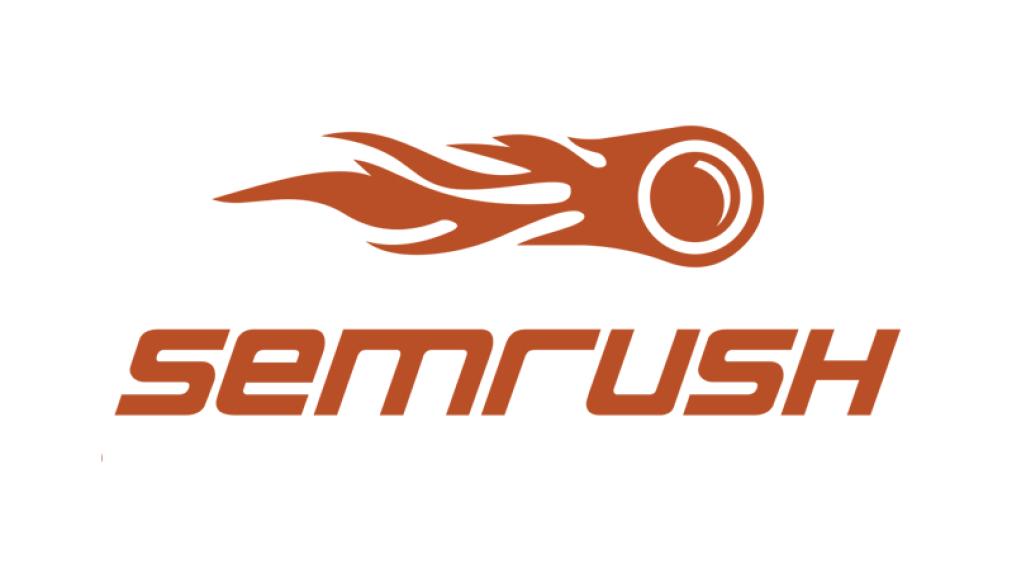
SEMrush is a complete digital marketing platform with 40+ tools covering all aspects of digital marketing. The company was founded in 2008 and has more than 800 employees in 7 countries.
Their tools are grouped into four main categories: SEO, paid traffic, social media, content marketing, and market research.
According to stats provided by SEMrush, their user base is 5 million and their database includes 18.8 billion keywords, and 717 million domains covering 142 geographic locations.
What makes SEMrush a great tool to consider is that it’s an all-in-one platform with a number of quality tools and features.
SEMRush Trial
If you want to test SEMRush yourself, you can use this link to register for a 14-Day SEMRush trial for free. You can use the tool for 14 days without any charge.
What is Aherfs?
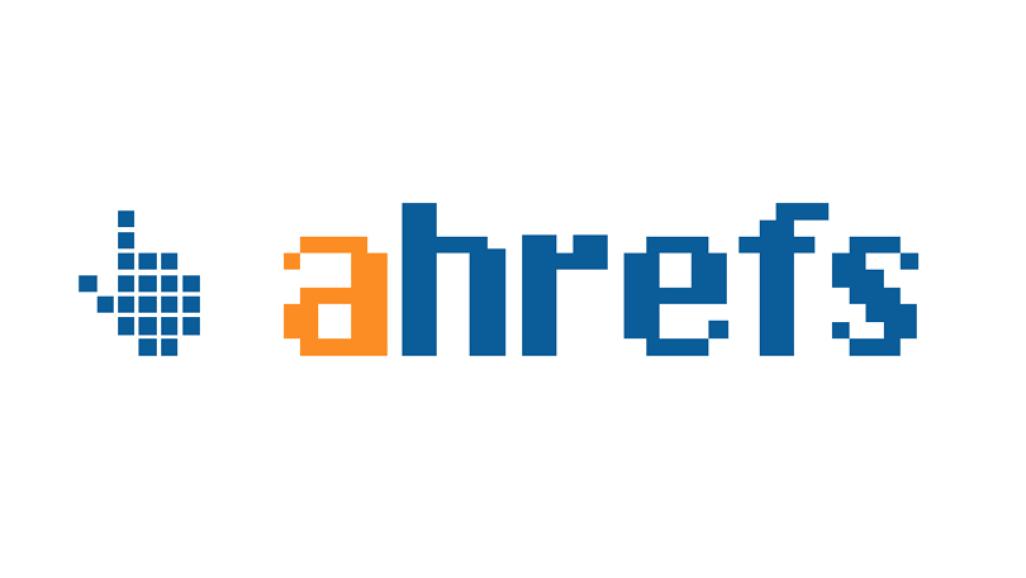
Ahrefs is an SEO platform offering a set of tools to grow your search traffic, research your competitors, and monitor your niche. The company started in 2010 and it became quickly one of the most popular SEO tools.
The main tools offered are site explorer, keywords explorer, site audit, rank tracker, and content explorer.
According to stats provided by Ahrefs, their database includes 10.3 billion keywords, 170 million root domains, 16 trillion known links, covering data of 10 search engines (including Google, Bing, YouTube, Amazon) in 171 countries.
What makes Ahrefs a great tool to consider is their comprehensive links database which makes it a very good option when it comes to link analysis and link building.
Ahrefs Trial
Ahrefs offers a 7-Day trial period for $7. During this period you get full access to the tool. To register for an ahrefs trial, use this link.
Overall, both SEMrush and Ahrefs have similar features, but which is the best tool to use?
Ahrefs VS SEMrush Comparison
We have compared SEMRush and Ahrefs against the following features
- SEO Auditing
- Keyword Research
- Rank Tracking
- Topic Research
- Identifying Link Building Opportunities
- Link Analysis
- Search Engine Marketing
- Social Media Features
- Tools to Analyze Content for SEO
- Ease of Use
- Pricing
- Support
1. SEO Auditing
When you’re planning a trip, you can’t find the right directions if you don’t know your starting point and final destination.
The same is true for SEO. Performing an SEO audit will help you create an SEO action plan and show you the path to follow to reach your destination which is no other than higher rankings for your target keywords.
Both SEMrush and Ahrefs offer a technical SEO audit feature. They evaluate your website using a number of pre-defined rules related to technical SEO and give you a list of recommendations on what you need to fix to improve your SEO performance.
The two tools are alike in that general audit structure, and they work in similar ways. They both include helpful instructions that explain the issues they’ve found and how to fix them.
One of the differences though is that SEMrush gives you more information about your internal link distribution.
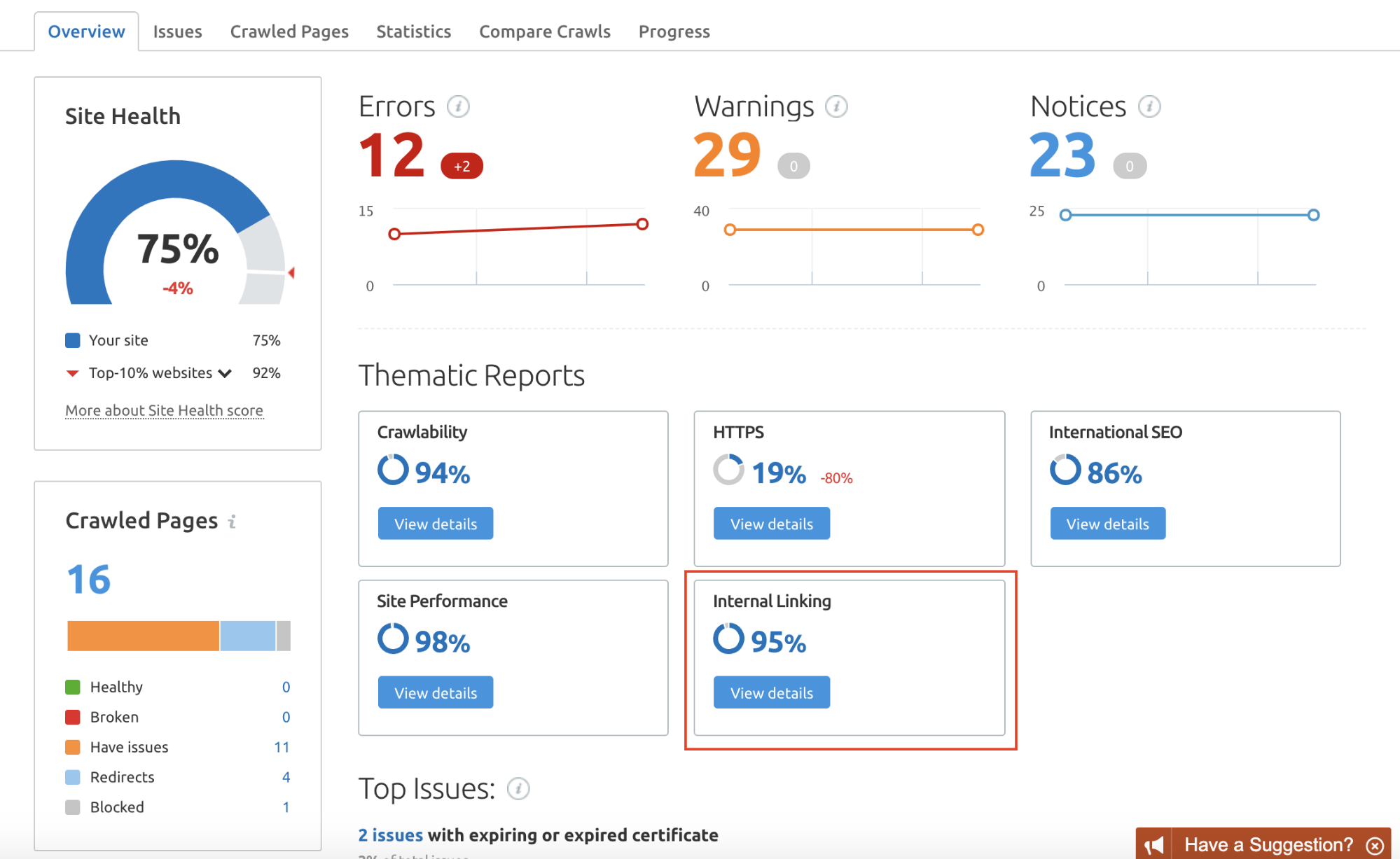
Your goal with internal linking is to help users by providing them with additional information about a topic and search engines by giving them hints as to which pages of your website are more important.
This is a very powerful (and simple to use) SEO technique and SEMrush makes it easier to understand how your internal links are distributed across your website.
2. Keyword Research
is one of the most important and critical SEO processes. If you get your keyword research wrong, you’ll end up targeting the wrong keywords and even if you manage to get traffic, it won’t convert.
So, it’s important to use a tool that provides accurate information about keywords.
Both SEMrush and Ahrefs give you strong insights into the keywords you want to optimize for on your site.
SEMrush calls their tool Keyword Magic, and its Ahrefs equivalent is the Keywords Explorer.
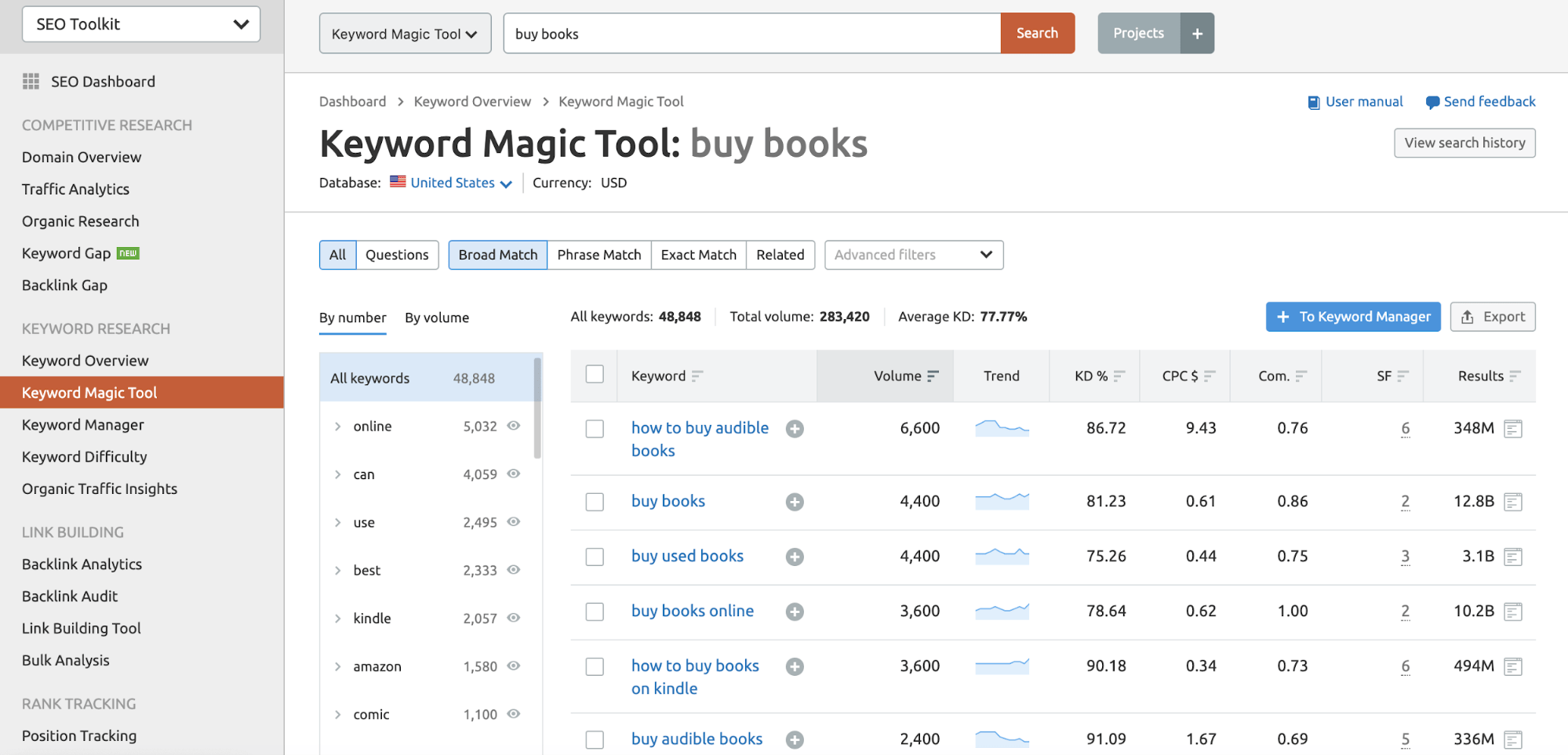
When searching for keywords for a particular topic, SEMrush seems to provide more results but Ahrefs has more filters to get rid of irrelevant or nonsense keywords.
Both SEMrush and Ahrefs also have content gap analysis tools, which can be a great help. They let you compare your site to your competitors’ sites that are ranking above you on search engine results pages (SERPs).
Both tools produce similar results by listing the keywords that your competitor is better optimized for.
Special Keyword Features
There are some features that are specific to one tool over the other, though. For instance, SEMrush offers comprehensive data about keyword trends that Ahrefs doesn’t.

The data lets you see which keywords are on the rise and which are falling in popularity. It also tells you if a keyword is popular at a particular time of the year, for example. Then you can focus on that keyword in your content during a particular season.
For its part, Ahrefs has a handy click estimation feature. This estimates the number of clicks you’d get for each keyword if you were the top-ranked result.

This is helpful because Google’s rich snippets often give users answers without having to click on any results. A keyword might have great search volume but if hardly anyone clicks on the results after searching it, it may not be worth your time.
3. Rank Tracking
As you work towards optimizing for particular keywords, you want to be able to see your results. This is where Ahrefs and SEMrush’s rank tracking features come in.
Both of these tools have rank trackers that show you how your ranking is shifting for specific keywords. They also show you your site’s overall average across all the keywords you’re tracking. Both tools let you compare your site to your competitors as well.
As far as accuracy goes, both tools appear to be equal. At first glance, Ahrefs appears to have an advantage because its interface is more attractive and easier to use. When you dig deeper, though, SEMrush wins in other critical areas.
SEMrush updates their rank tracking every day. This lets you watch your results in real-time and get a powerful picture of rank fluctuations.
With Ahrefs, the most frequent update schedule available is every three days. That is only the frequency for Ahref’s two most expensive plans. With their most economical plan, you only get weekly updates.

4. Topic Research
Your site’s content is a vital part of your SEO. One of the top ways to produce SEO-focused content is to check out the competing content that performs well and use it as a model.
Ahrefs makes that easy with their Content Explorer tool, and SEMrush does the same with their Topic Research tool.
Both of those tools go beyond basic web stats. They tell you how each page in the search results is performing on social media. Whether you want content that will be popular on Google or on a specific social media platform, you can optimize accordingly.
Ahrefs has a slight edge in this area with its publication history. It tells you how many pages are published and updated for that topic over time.

This helps you see whether the topic is on the rise or the decline among content creators. You’ll be able to identify the topics that are in need of a fresh perspective and those with a lot of competing content.
5. Identifying Link Building Opportunities
Building a network of backlinks from reputable, high-volume sites will make a world of difference for your SEO. If you’re struggling to see where to start, SEMrush and Ahrefs both have features designed to help.
Broken-link building
This is a newer feature on Ahrefs’s platform. They added it to their Content Explorer when they debuted Content Explorer 2.0 in May 2019. You can search for a particular topic and the tool identifies broken backlinks.
You can use that information by identifying pages with many backlinks that have now moved or disappeared. If you recreate the content on your site and send the link to the sites that link to the broken URL, they may swap it for your link. It’s a handy way to get new backlinks.
SEMrush’s tool is called the Link Building Tool. It does the same thing Ahrefs does by identifying broken and outdated links. It also has another feature, though.
SEMrush’s distinctive tool identifies many ways to build your backlinks. It offers a list of sites you could reach out to in order to get a backlink.

Along with that list, SEMrush gives you the contact information for as many of those sites as possible. It integrates with many email platforms so you can contact the sites directly from SEMrush. The tool tracks all that outreach so you can see the fruits of your labor.
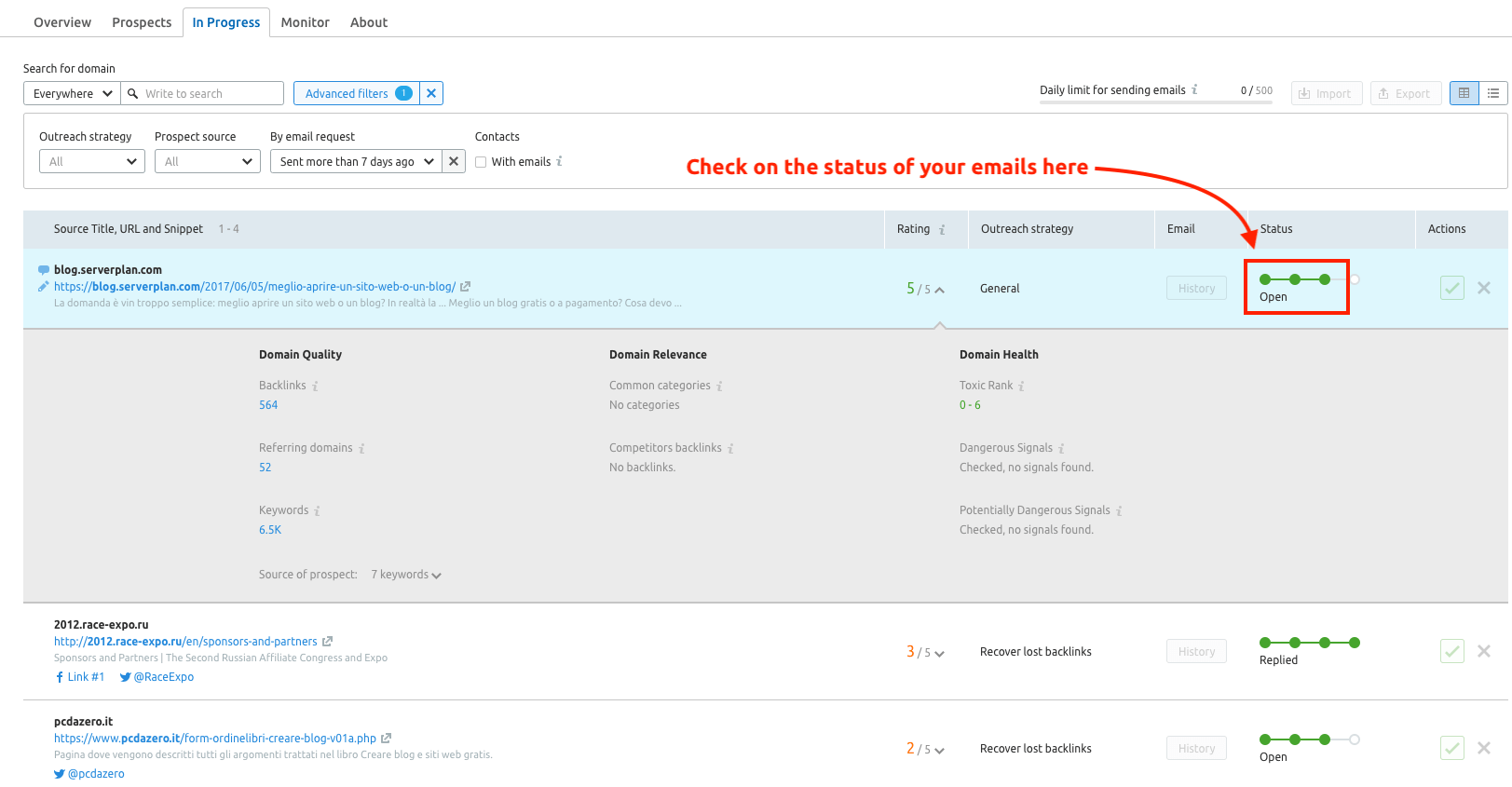
6. Link Analysis
Backlinking isn’t just a numbers game. You need your backlinks to be from credible sites. The opposite can actually harm your SEO.
Both tools let you check website backlinks and referring domains they each have. In the past, Ahrefs was the better choice for link analysis because they had a stronger database.
However, SEMrush did a major database update in 2019. Since then, the two tools are neck-and-neck for performance.
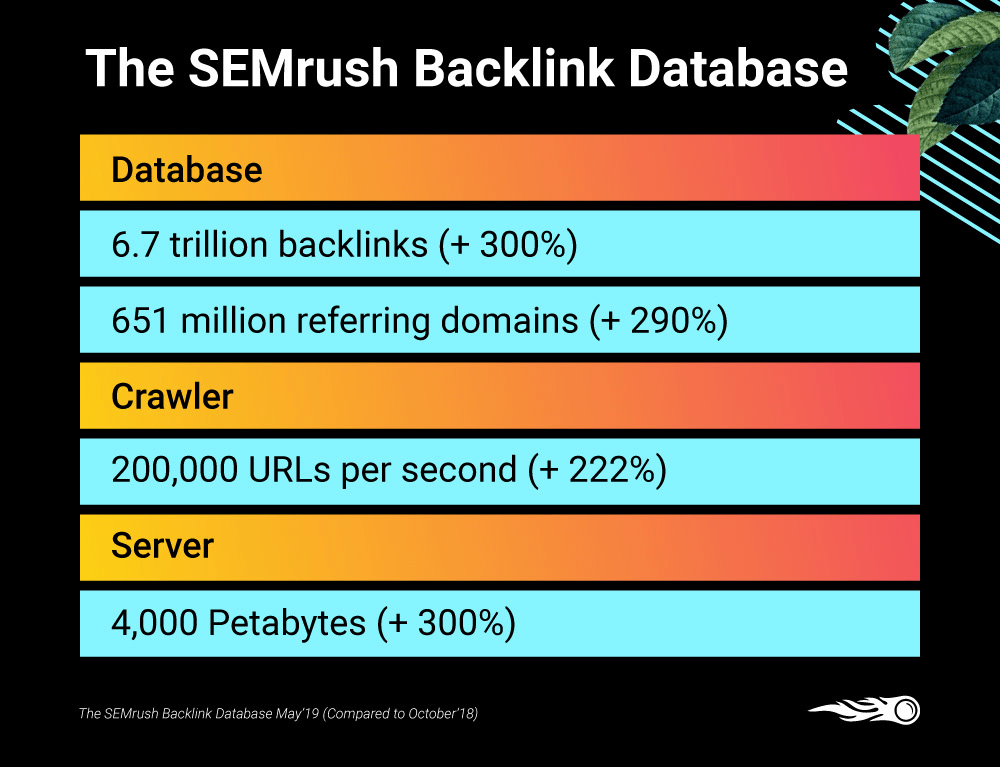
Overall, SEMrush wins out because of a crucial special feature: its backlink audit tool. This identifies potentially toxic backlinks that could be hurting your SEO. You can disavow them with Google to stop the damage.
Ahrefs doesn’t have this feature, though it does show you which of your backlinks have the lowest domain authority. From there, you could investigate each site to see if it’s a potential problem.
7. Search Engine Marketing
Along with its keyword research tool, SEMrush has a unique feature Ahrefs doesn’t have. It shows you keyword data for PPC ads like Google Ads and product listing ads, or PLAs.
SEMrush also has a cost-per-click map, showing you how much you’re paying for clicks from different regions. As a result, SEMrush goes beyond your site’s SEO to help all facets of your search engine marketing campaigns.
8. Social Media Features
This is another SEMrush-only feature. Beyond all the data it offers you for building your SEO, it helps you manage and evaluate your social media marketing.
You can use SEMrush to schedule your social media posts for numerous platforms. SEMrush also tracks your social media analytics to offer all the data in one place. Better yet, the tool shows you your competitors’ analytics.

9. Tools to Analyze Content for SEO
Finally, this is the third useful feature SEMrush offers that Ahrefs doesn’t: content marketing audits. This tool evaluates your content for its SEO capabilities. It shows you your keyword frequency, readability, and other scores for each page.
If you’ve used the popular WordPress plug-in, Yoast, SEMrush’s Content Auditing Tool is similar. The tool can evaluate your published content or you can use it while you’re writing and updating the content.
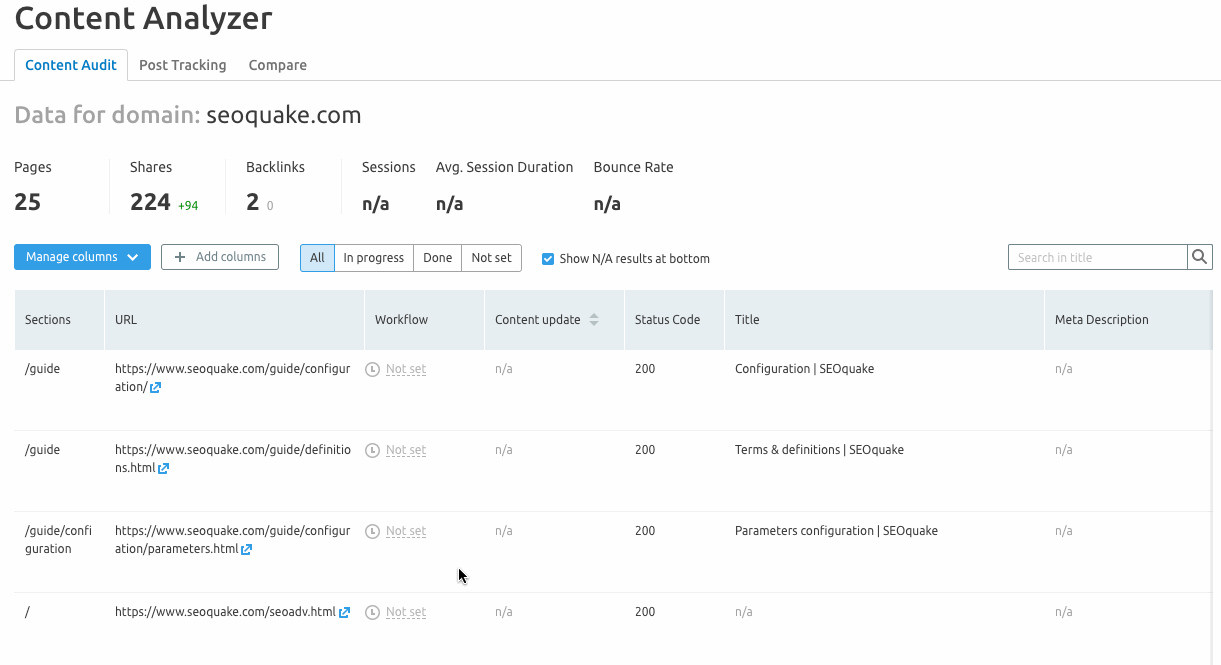
As we noted, this is a tool Ahref’s doesn’t have, just like social media management and SEM keyword data. To be fair, this is simply because Ahrefs focuses on a more specialized type of SEO data. SEMrush aims to be a more diverse tool.
10. Ease of Use
When it comes to usability, Ahrefs and SEMrush both have their advantages and disadvantages. Ahrefs has a more intuitive user interface. Data is prominent and their graphics make it easy to understand at a glance.
In our experience, though, SEMrush has better performance. Ahrefs is sometimes slow to load. If you’re trying to check many sites or pages in a short period of time, Ahrefs may slow you down.
It comes down to a matter of preference in this case. Some users prioritize performance while others feel that Ahrefs’s interface is with the time.
11. Pricing
Cost is always an important consideration, and for the most part, Ahrefs and SEMrush are similar.
Both of these tools offer several plans with increasing capabilities. They each start around $99 per month for one user.

It’s important to note that Ahrefs’s $99 is more limited than SEMrush’s $99 plan. However, Ahrefs’s pricier plans offer more users for the price: three users for the Advanced plan, five for the Agency plan. SEMrush only offers one user for every plan price with the option to add more users for additional fees.
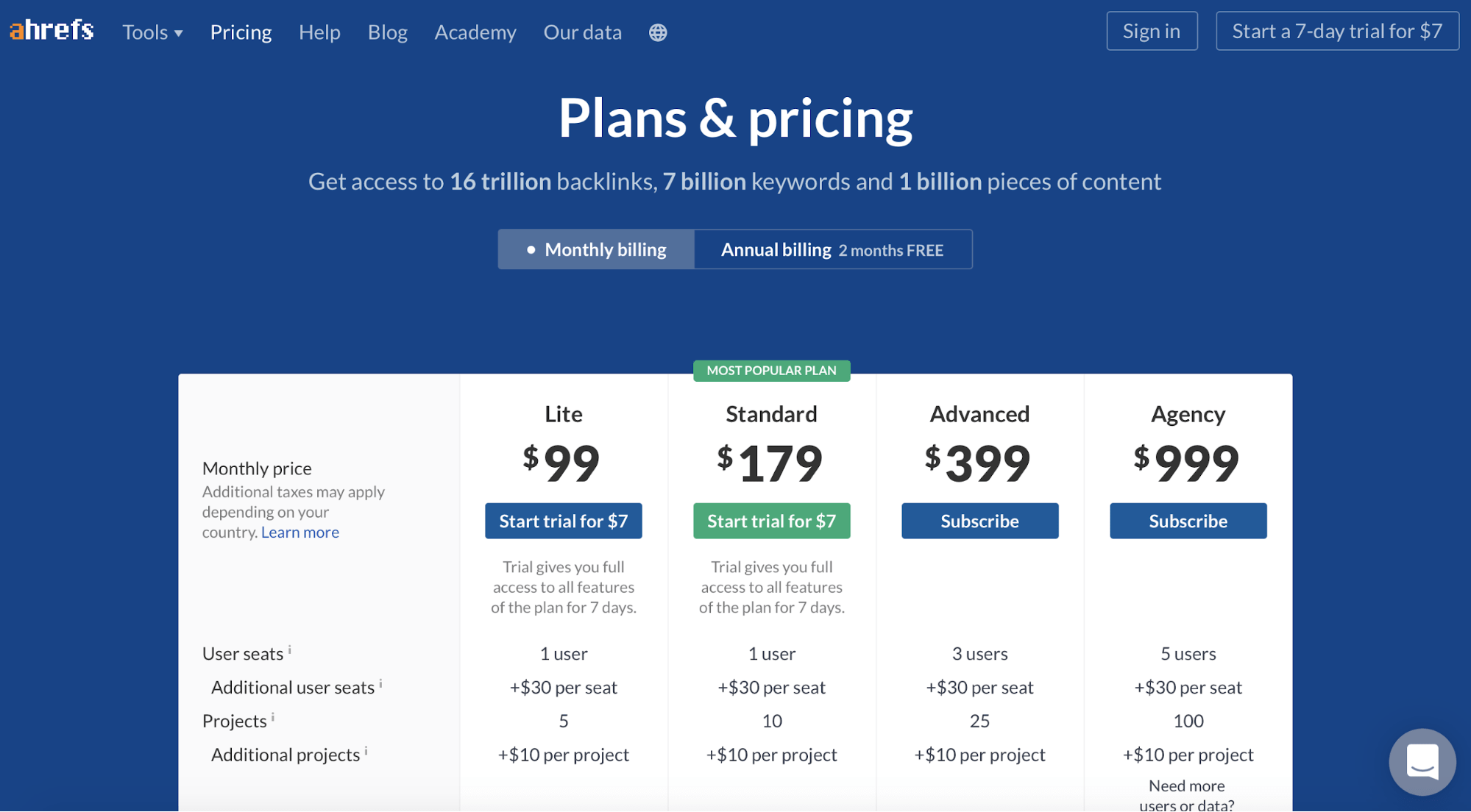
Depending on how many users you need, SEMrush may be a better deal because of its extra features. For instance, it allows you to cut out the cost of Yoast Premium as well as your social media management tools.
12. Support
Overall, both Ahrefs and SEMrush have reliable performance. Still, you always need to know whether a tool has solid support in case a problem arises.
Both of the tools are very quick and responsive in their support. They also both allow you to reach them with an online chat feature.
With Ahrefs, though, the chat feature is where it stops. There is no visible way to reach them by phone or through email. SEMrush, on the other hand, provides email and phone support in addition to their chat.
Ahrefs vs SEMrush: The Verdict
When all is said and done, what’s the final word? Who wins in the battle of Ahrefs vs SEMrush?
Those that follow my posts know that my preferred tool is SEMRush. It’s the tool that I use on a daily basis for all my digital marketing needs. It’s easy to use, affordable, and reliable. New features are introduced all the time and in general, you get the feeling that the money you pay for the monthly subscription is worth it.
That doesn’t make Ahrefs a bad tool. On the contrary, it is a great tool but when it comes to features, SEMRush gives you more tools to manage your digital marketing campaigns and not just SEO.



